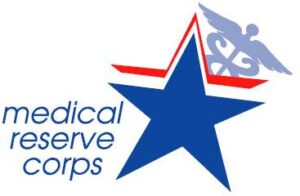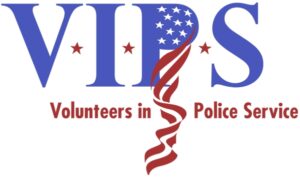If you have any questions or need assistance with any Community Preparedness program, email Nicole Nixon.
 The Community Emergency Response Team (CERT) Program educates people about disaster preparedness and trains them in basic disaster response skills, such as fire safety, light search and rescue, and disaster medical operations. Using their training, CERT members can assist others in their neighborhood or workplace following an event and can take a more active role in preparing their community. The program is administered by the Federal Emergency Management Agency. Please visit the CERT program web page for more information.
The Community Emergency Response Team (CERT) Program educates people about disaster preparedness and trains them in basic disaster response skills, such as fire safety, light search and rescue, and disaster medical operations. Using their training, CERT members can assist others in their neighborhood or workplace following an event and can take a more active role in preparing their community. The program is administered by the Federal Emergency Management Agency. Please visit the CERT program web page for more information.
 The Fire Corps promotes the use of citizen advocates to enhance the capacity of resource-constrained fire and rescue departments at all levels: volunteer, combination, and career. Citizen advocates can assist local fire departments in a range of activities including fire safety outreach, youth programs, and administrative support. Fire Corps provides resources to assist fire and rescue departments in creating opportunities for citizen advocates and promotes citizen participation. Fire Corps is funded through DHS and is managed and implemented through a partnership between the National Volunteer Fire Council, the International Association of Fire Fighters, and the International Association of Fire Chiefs. Please visit Fire Corps for more information.
The Fire Corps promotes the use of citizen advocates to enhance the capacity of resource-constrained fire and rescue departments at all levels: volunteer, combination, and career. Citizen advocates can assist local fire departments in a range of activities including fire safety outreach, youth programs, and administrative support. Fire Corps provides resources to assist fire and rescue departments in creating opportunities for citizen advocates and promotes citizen participation. Fire Corps is funded through DHS and is managed and implemented through a partnership between the National Volunteer Fire Council, the International Association of Fire Fighters, and the International Association of Fire Chiefs. Please visit Fire Corps for more information.
 The National Neighborhood Watch Program (formerly USAonWatch), housed within the National Sheriffs’ Association, has worked to unite law enforcement agencies, private organizations, and individual citizens in a nationwide effort to reduce crime and improve local communities.
The National Neighborhood Watch Program (formerly USAonWatch), housed within the National Sheriffs’ Association, has worked to unite law enforcement agencies, private organizations, and individual citizens in a nationwide effort to reduce crime and improve local communities.
Please visit the National Neighborhood Watch Program website https://www.nnw.org/ for more information.
 The Medical Reserve Corps (MRC) Program strengthens communities by helping medical, public health and other volunteers offer their expertise throughout the year as well as during local emergencies and other times of community need. MRC volunteers work in coordination with existing local emergency response programs and also supplement existing community public health initiatives, such as outreach and prevention, immunization programs, blood drives, case management, care planning, and other efforts. The MRC program is administered by HHS. Please visit the Medical Reserve Corps for more information.
The Medical Reserve Corps (MRC) Program strengthens communities by helping medical, public health and other volunteers offer their expertise throughout the year as well as during local emergencies and other times of community need. MRC volunteers work in coordination with existing local emergency response programs and also supplement existing community public health initiatives, such as outreach and prevention, immunization programs, blood drives, case management, care planning, and other efforts. The MRC program is administered by HHS. Please visit the Medical Reserve Corps for more information.
 Volunteers in Police Service (VIPS) works to enhance the capacity of state and local law enforcement to utilize volunteers. VIPS serves as a gateway to resources and information for and about law enforcement volunteer programs. Funded by DOJ, VIPS is managed and implemented by the International Association of Chiefs of Police. Please visit Volunteers in Police Service for more information.
Volunteers in Police Service (VIPS) works to enhance the capacity of state and local law enforcement to utilize volunteers. VIPS serves as a gateway to resources and information for and about law enforcement volunteer programs. Funded by DOJ, VIPS is managed and implemented by the International Association of Chiefs of Police. Please visit Volunteers in Police Service for more information.
 Community Preparedness Program is coordinated nationally by the Department of Homeland Security. DHS also works closely with the Corporation for National and Community Service (CNCS) to promote volunteer service activities that support homeland security and community safety. CNCS is a federal agency that operates nationwide service programs such as AmeriCorps, Senior Corps, and Learn and Serve America. Participants in these programs may support Community Preparedness Program activities by helping to establish training and information delivery systems for neighborhoods, schools, and businesses, and by helping with family preparedness and crime prevention initiatives in a community or across a region. Please visit CNCS for more information.
Community Preparedness Program is coordinated nationally by the Department of Homeland Security. DHS also works closely with the Corporation for National and Community Service (CNCS) to promote volunteer service activities that support homeland security and community safety. CNCS is a federal agency that operates nationwide service programs such as AmeriCorps, Senior Corps, and Learn and Serve America. Participants in these programs may support Community Preparedness Program activities by helping to establish training and information delivery systems for neighborhoods, schools, and businesses, and by helping with family preparedness and crime prevention initiatives in a community or across a region. Please visit CNCS for more information.